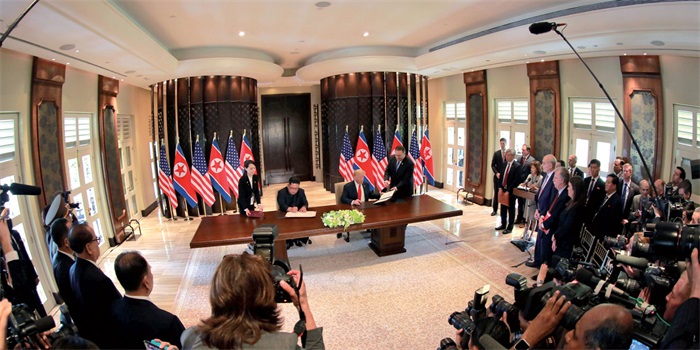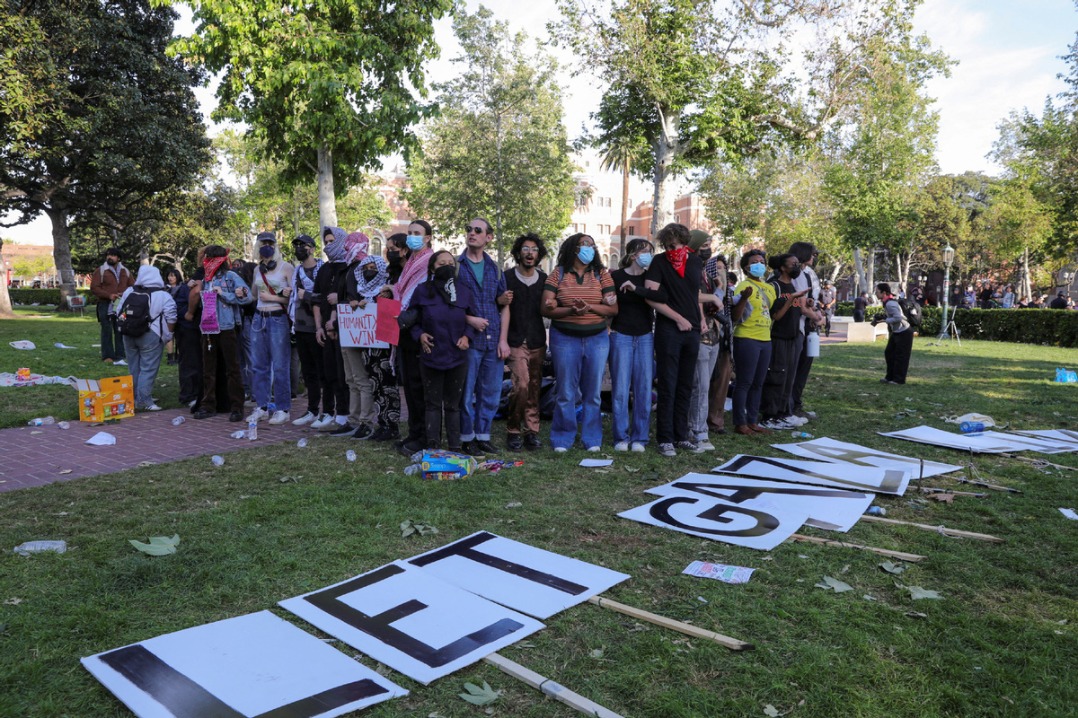After historic summit, focus to shift to results
By Zhao Huanxin in Washington | China Daily USA | Updated: 2018-06-13 15:59

Trump-Kim joint statement outlines course; need to keep momentum seen
The just-concluded Singapore summit in which a sitting US president met face-to-face with the top leader of the Democratic People's Republic of Korea for the first time was a first step toward the goal of a denuclearized Korean Peninsula.
Whether the promises and consensus made during the meeting on Tuesday were more about headlines than substantive progress will depend on how Washington, Pyongyang and other stake holders maintain the diplomatic momentum set in motion by the summit and produce early results.
A major test is whether US President Donald Trump will halt the war games with American ally, the Republic of Korea, as promised, and how the sanctions will be addressed.
In their joint statement, the DPRK and the US said they would commit to establishing a new relationship, and that the DPRK would work toward denuclearization of the Korean Peninsula, while the US commits to provide security guarantees to the DPRK.
At the news conference after the summit, Trump said that his top aides would meet with DPRK officials next week for further nuclear talks.
The immediate follow-up discussions could add substance to a joint statement that some critics said lacks specifics. As Abraham Denmark of the Wilson Center in Washington tweeted, "Where there is diplomacy there is hope."
Trump also said he wants China's involvement in the signing of a peace treaty to replace the current armistice agreement after the 1950-53 Korean War. He did not specify when it will happen.
But when it comes to his offer of stopping war games, there is actually a time element attached to it.
Trump said, "We will be stopping the war games, which will save us a tremendous amount of money unless and until we see the future negotiation is not going along like it should. But we'll be saving a tremendous amount of money. Plus, I think it's (the military exercise) very provocative."
The annual US-ROK military drills are carried out twice in spring and fall. The autumn military exercises are scheduled for August.
Pyongyang has consistently denounced the drills as a dress rehearsal for an invasion.
The springtime joint military drills were delayed and conducted in April to help create a favorable atmosphere for the Winter Olympics hosted by the ROK in February, to which the DPRK sent a delegation. However, the DPRK suspended a high-level inter-Koreas talk in protest of the war games.
It is true that Trump will have to steer clear of being swayed by different opinions from politicians and military officials in Washington and beyond, some of whom claimed they were caught off-guard by Trump's decision, and that the "routine and defensive" joint drills are part of the core of the US-ROK alliance.
The US-DPRK statement said that the two sides recognize "mutual confidence building can promote the denuclearization of the Korean Peninsula". Both Pyongyang and Washington could follow with actions to increase confidence-building.
While the DPRK is expected, in Trump's words, to start the process of the denuclearization of Korean Peninsula "very, very quick", the US president also would have to deliver on his promise regarding security guarantees, with the halting of military drills a concrete step.
The negotiations following the summit must produce some early results or "wins" in order for all parties to place faith and political capital in the process, Victor Cha, a senior adviser and the Korea Chair at the Center for Strategic and International Studies, and Sue Mi Terry, a senior fellow with the CSIS Korea Chair, said in an analysis on Tuesday.
They said that for the DPRK, early results in terms of the lifting of sanctions will be sought, as well as progress on defining a path to peaceful and normalized political relations.
Earlier on Tuesday, Kim said he and Trump had "decided to leave the past behind. The world will see a major change."
It is unclear what specifically is "the past" to leave behind, but it most probably includes the tensions and animosities between the two sides, and the confrontational rhetoric and behaviors that intensify the adverse feelings.
Trump on Tuesday said he has held off imposing new sanctions, and the current sanctions will come off when the DPRK's nuclear weapons "are no longer a factor".
It is noteworthy that China has long proposed a "dual suspension" whereby the DPRK suspends its weapons tests, and the US and the ROK suspend military drills, which is becoming closer to a reality.
It now supports adjusting the sanctions according to how the DPRK behaves.
"The relevant (United Nations) Security Council resolutions stipulate that we shall adjust sanction measures as may be needed in light of the DPRK's compliance, including suspending or lifting relevant sanction measures," Foreign Ministry spokesman Geng Shuang said at a daily briefing.
Contact the writer at huanxinzhao@chinadailyusa.com
























